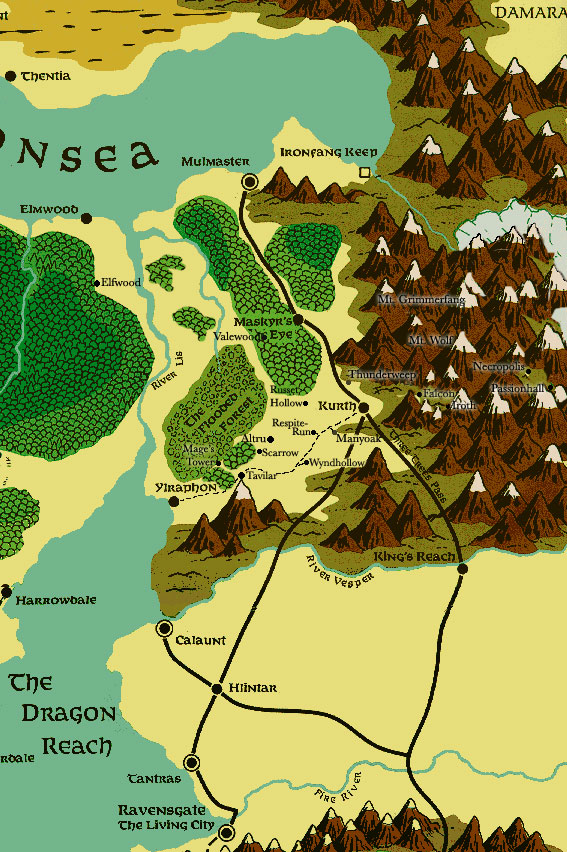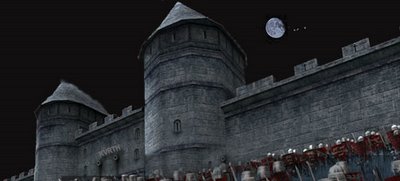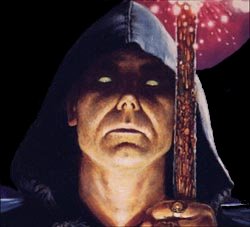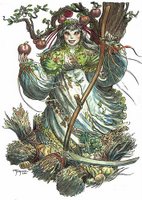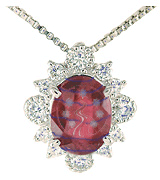AT THE TABLE
(Dungeon Theory:Part I)
I'd like to build on Chip's recent comments about playing heroic characters, because I appreciate that style of play and I agree that it is fun to occasionally drop a 'bomb' on the DM. Additionally, as a DM I'd love to have even more bombs dropped spontaneously every-moment-of-the-game. An effective means to this, I suggest, is making those heroic decisions primarily at the table.
Concept: When players voice opinions, plans, attitudes, actions, and thoughts at the D&D table, the game moves to another level. This level is perhaps a higher level of participation - one of trust and collaboration.
Example 1: [Collaborative DM-player relationship]
*Scenario: Mialee is angry at the local baron for being too wrapped up in politics and legislation to notice the Dragon Cult activity in town. In an encounter with him, the following occurs at the table:
Player: Mialee has basically come here with the intention of getting the baron to really listen this time. She's not giving up until he does!
DM: What are you going to do?
Player: I'm walking right past the guards and into the barons chamber this time whether he is busy or not.
DM: Mialee arrives as though on a mission, the guards notice the frustration on your face and step aside as you briskly open the office door. The baron appears busy writing at his desk.
Player: Mialee is feeling angry and feels like smashing something to symbolically awaken baron Halfig to the reality of the cult in town.
DM: What do you do?
Player: With the sweeping motion of her arm I look for a bookcase containing volumes of legislation and knock them to the ground saying,"You insular fool! Can you not hear their footsteps in town? They're corrupting this town beneath you! You must do something before its too late!"
DM: [announcing to all players] Mialee sweeps a series of heavy bound books from the shelf, her voice echoing down the hall. The baron's hand scribbles a wild line as he looks up, seemingly ready to listen to what Mialee has to say.
Example #2 (The Adversarial DM-Player Relationship)
*Same scenario: Mialee is angry at the local baron for being too wrapped up in politics and legislation to notice the Dragon Cult activity in town. In an encounter with him, the following occurs at the table:
Player: I go to see the baron. [Looks at other players knowingly, having discussed this in private without the DM]
DM: Where do you go?
Player: To the baron's office house.
DM: Two guards stand ready, watching the doors as always.
Player: I try to push past them.
DM: Roll initiative
Player: Mialee yells as loud as she can, "You insular fool! Can you not hear their footsteps in town? They're corrupting this town beneath you! You must do something before its too late!" I get an 11 for intiative.
DM: The guards act before you, attempting to grapple you to the ground. You hear shutters closing on a window nearby, perhaps the baron does not wish to be disturbed.
Consider Example 1: Why was the scene dramatic? Who's idea was it first to place a bookshelf in the room? Was it necessary for the player to plan on knocking books down prior to the actual moment of game play at the table? Do you think the player views the DM as adversarial or do you think the player and DM trust each other to both create the drama as well as some story elements? When the player shares thoughts/opinions/plans/attitudes/actions at the table, how might this help both the player, the DM, and the other players? (in the moment, as well as later?) Would you think the rest of the players might enjoy watching a scene like this take place (whether their characters were there or not?)
To Sum It Up: In my opinion the best games are played when the players are not adversarial, rather collaborative with the DM. The NPCs are your adversaries, not the DM. In theory, if the DM were the adversary, all the characters would be dead. Keeping secrets from the DM neither serves to help the characters, the other players, nor the game. Conversely, the DM (and other players) knowing things (even intentions and thoughts) helps facilitate the story to make it richer. The DM (and even other players) can then use that information to help the players-characters-and the story. Help is defined as a richness in both wealful and woeful story events. Simply put, the more the DM knows the better the 'play' (drama).
Our Game: Everyone is doing great. This post has nothing to do with the past. Recent planning events made sense due to the limited time we play & the amount of planning that was desired to be done. Its important for everyone to know, I appreciated it! In the future, if we can play more of that heroic stuff at the table I think we'll experience an even greater high. (i.e. think about how electric Kelestri's challenge to Animosus and Evan was! think about Corim's justification speech when he had stabbed the UR Priest! think about Leif's breakdown at the altar of blood!) These are just some of the outstanding, on-the-fly RP with unplanned outcomes that helped define our characters). Yes, please—more of that!
"At the table" implies reacting on-the-fly and demonstrating the passionate, dramatic, genius of heroism. Generally, reacting to stuff previously dreamt-up in basements, side-bars, and personal phone calls doesn't lend itself well to in-the-moment, dynamic, electric, heroic, and epic story telling (although, as we've seen, there is a place for that too).
*Only An Example: This scenario is imperfect and meant only to convey the concept. I wish to focus more on the concept than on the specific Mialee scenarios.

